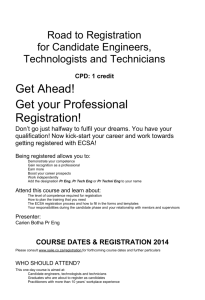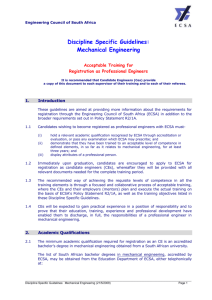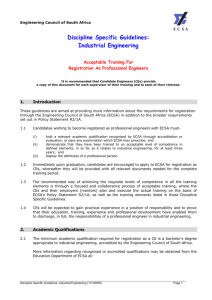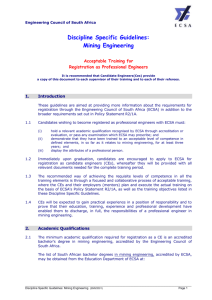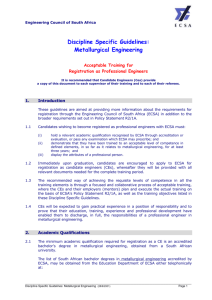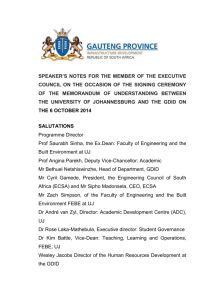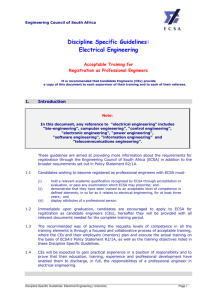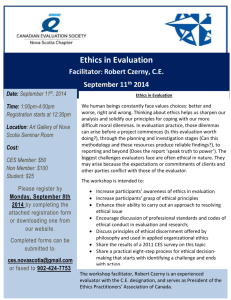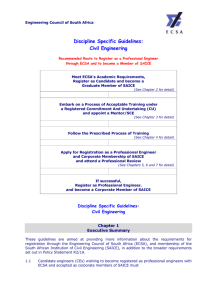Discipline Specific Guidelines: Chemical Engineering
advertisement
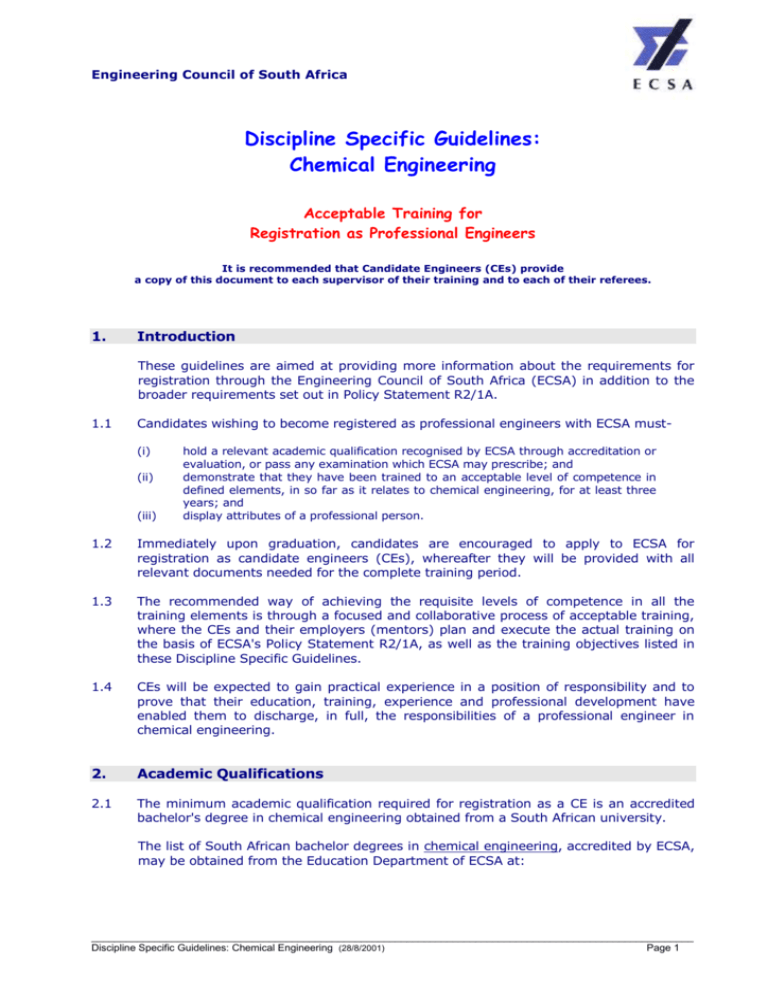
Engineering Council of South Africa Discipline Specific Guidelines: Chemical Engineering Acceptable Training for Registration as Professional Engineers It is recommended that Candidate Engineers (CEs) provide a copy of this document to each supervisor of their training and to each of their referees. 1. Introduction These guidelines are aimed at providing more information about the requirements for registration through the Engineering Council of South Africa (ECSA) in addition to the broader requirements set out in Policy Statement R2/1A. 1.1 Candidates wishing to become registered as professional engineers with ECSA must(i) (ii) (iii) hold a relevant academic qualification recognised by ECSA through accreditation or evaluation, or pass any examination which ECSA may prescribe; and demonstrate that they have been trained to an acceptable level of competence in defined elements, in so far as it relates to chemical engineering, for at least three years; and display attributes of a professional person. 1.2 Immediately upon graduation, candidates are encouraged to apply to ECSA for registration as candidate engineers (CEs), whereafter they will be provided with all relevant documents needed for the complete training period. 1.3 The recommended way of achieving the requisite levels of competence in all the training elements is through a focused and collaborative process of acceptable training, where the CEs and their employers (mentors) plan and execute the actual training on the basis of ECSA's Policy Statement R2/1A, as well as the training objectives listed in these Discipline Specific Guidelines. 1.4 CEs will be expected to gain practical experience in a position of responsibility and to prove that their education, training, experience and professional development have enabled them to discharge, in full, the responsibilities of a professional engineer in chemical engineering. 2. Academic Qualifications 2.1 The minimum academic qualification required for registration as a CE is an accredited bachelor's degree in chemical engineering obtained from a South African university. The list of South African bachelor degrees in chemical engineering, accredited by ECSA, may be obtained from the Education Department of ECSA at: _________________________________________________________________________________________________________ Discipline Specific Guidelines: Chemical Engineering (28/8/2001) Page 1 Tel: Fax: E-mail: Web: (011) 607-9500 (011) 622-9295 engineer@ecsa.co.za www.ecsa.co.za or in writing at: Private Bag X691 Bruma 2026 2.2 Persons who have graduated from a university not accredited by ECSA will be assessed individually on merit. If their qualifications are evaluated as being at least equivalent to an accredited South African degree, candidates will be eligible for registration as CEs and could then follow the formal route to registration as professional engineers. 2.3 Persons whose qualifications are not accredited or recognised by ECSA may follow an alternative route to meet the academic requirements for registration as CEs. Candidates must apply to ECSA and obtain the necessary information on the procedure to be followed. 2.4 Those who meet ECSA's academic requirements should register as CEs without delay. Application forms can be obtained from ECSA. CEs must, from the outset, also obtain copies of the application form for registration as professional engineers. 3. Training and Professional Development under a Commitment and Undertaking (CU), and Mentorship Commitment and Undertaking (CU) 3.1 CEs must persuade their employers to register a Commitment and Undertaking with ECSA, namely that they will structure the training of, and actually train, their CEs, in accordance with the requirements of ECSA's Policy Statement R2/1A as well as the requirements set out in these Discipline Specific Guidelines. Each CU will be allocated a permanent registration number, which should be quoted by all CEs when applying for registration as professional engineers. 3.2 Employers must, at the same time, submit the name(s) of a mentor(s) from within the organisation (see § 3.4 below) or, if an internal mentor is not available, the name of an external mentor (see § 3.5 below) to guide CEs through the required process of training. A CU will not be registered by ECSA unless the name of at least one mentor (internal or external) is provided. Mentorship and Supervision 3.3 ECSA and the South African Institution of Chemical Engineers (SAIChE) will jointly maintain a list of internal and external mentors. A mentor must be registered as a professional engineer. Council will only in exceptional cases consider the listing of experienced and mature professional engineering technologists, professional certificated engineers, or professional engineering technicians, upon application and motivation by the organisation/mentor concerned. These mentors will be deemed not only to be capable of fulfilling their functions in a professional manner but also as being committed to advising and guiding their CEs in their professional development. 3.4 It is STRONGLY RECOMMENDED that all CEs should have a mentor who is working in the same organisation as the CE (internal mentor). 3.5 If an internal mentor is not available, a list of external mentors can be obtained from ECSA or SAIChE. It will be expected of employers who make use of the services of external mentors to create an environment in which such mentors can feel free to make recommendations in the reasonable knowledge that their recommendations will be given sympathetic consideration. _________________________________________________________________________________________________________ Discipline Specific Guidelines: Chemical Engineering (28/8/2001) Page 2 3.6 It will be expected of all mentors to become fully conversant with their functions and responsibilities referred to in Policy Statement R2/1A and guidelines issued by ECSA from time to time, to conduct regular discussions with their CEs and to assess their progress in accordance with the guidelines set out in Policy Statement R2/1A and these Discipline Specific Guidelines. Since the effectiveness of mentors will continuously be monitored, Council will attach much value to the opinion of "the conscientious mentor" as to the registrability (or otherwise) of their CEs. 3.7 It is not expected of mentors to take responsibility for the day-to-day supervision and training of CEs. Mentors/employers should do everything in their power to ensure that competent persons, preferably registered with ECSA, are available to oversee this function as supervisors. 4. General 4.1 Training reports, which must be updated regularly, form an essential part of the monitoring process, and these reports must be filled in on the correct forms (Forms A2.1 and A2.2) of the application form. These forms are part of the application form, which should be obtained from ECSA as soon as the CEs start their training. 4.2 It is a requirement that CEs who are aspiring to become professional engineers should, with the assistance of their mentors, achieve their training objectives by structuring their training in such a way as to cover the various elements of training referred to in Policy Statement R2/1A and these Discipline Specific Guidelines. 4.3 The rate at which CEs progress through their training is determined by themselves, their mentors and other factors, such as the state of the economy and availability of training opportunities. 4.4 Where CEs, training under a CU decide to change employers, they should ensure that they continue their training under another CU registered by their new employers. CEs should also ensure that their new employers provide mentors to guide them through the remainder of their training period and to take over where the previous mentor ended. It may even be advisable to retain the previous mentor, if this is at all practicable. 4.5 Once all the objectives have been achieved to the satisfaction of the mentor, CEs should, in principle be registerable, and could then apply for registration as professional engineers. Depending on the circumstances, CEs may expect to take a minimum of three years to achieve acceptable competence in all the prescribed elements. 4.6 Regardless of whether or not CEs train under a CU, it is recommended that they strive to participate in a process of continuing learning. This concept includes continuing education and professional development. 4.7 Continuing learning may include attending courses, technical conferences, seminars, symposia, organised site visits, and meetings of professional bodies, as well as selfstudy. The process of continuing learning should achieve a balance between technical content and managerial/professional aspects. 4.8 The mentors of CEs should, on a consultative basis, suggest suitable continuing learning programmes. 4.9 SAIChE and educational institutions may be able to assist in advising on courses which are available. _________________________________________________________________________________________________________ Discipline Specific Guidelines: Chemical Engineering (28/8/2001) Page 3 4.10 It will be to the advantage of CEs when applying for registration as professional engineers if they can demonstrate their participation in a process of continuing learning. 5. Discipline Specific Elements 5.1 Introduction - Evaluation of Training The acceptability of the total training is evaluated by ECSA when, after completion of the training, an application for registration as a Pr Eng has been submitted. Council's evaluation is based on the applicant's ability to solve technical problems and manage engineering tasks by showing: engineering skill and judgement; decision making ability knowledge of relevant legislation ability to communicate with all relevant parties appreciation of ethical and social issues The training should focus on carrying out meaningful engineering tasks, preferably under the direct supervision of a chemical engineer, under the general guidance of a Professional Engineer and following (if available) a training programme for chemical engineers. 5.2 Core Elements in The Training of Chemical Engineers Chemical engineers usually work on plant operations, product application, contracting (projects), process development or research. In all these cases, the core of the work requires both logical and creative thinking and consists of a combination of: In these core elements, CEs must critically apply their knowledge of scientific and engineering principles in full awareness of the engineering procedures applicable to their discipline of engineering. They must make themselves aware of the structure of the organisation in which they work and of the functions of the various organisations involved in their discipline of engineering, such as the SA Institution of Chemical Engineers. In this professional environment ECSA requires the CE to have: a general knowledge of legislation which has a bearing on the practice of engineering in South Africa, with a working knowledge of the provisions of the Engineering Profession Act, 2000 (Act 46 of 2000), and the Acts and Regulations applicable to their specific discipline of engineering; a good understanding of the code of Professional Conduct applicable to registered persons; full familiarity with the requirements for registration set out in Policy Statement R2/1A as well as in these discipline specific guidelines. 5.2.1 Problem solving Problem solving deals not only with current problems ("trouble shooting"), but also with envisaged future problems and the exploration of opportunities for improvements and innovation. Problem solving consists of a sequence with the following major steps: _________________________________________________________________________________________________________ Discipline Specific Guidelines: Chemical Engineering (28/8/2001) Page 4 organisation of the available information on a recognised problem problem analysis (including cause identification) synthesis of problem solutions evaluation of problem solution which must meet the objective, using criteria such as: 5.2.2 product specifications capital and operating costs operability; integration into existing situation hazards and environmental aspects to arrive at a decision on the optimum solution, implementation of the problem solution monitoring of the results Management In the management of problem solving in its broadest sense, chemical engineers will have to deal with "the five Ms", always to be considered in the context of Time and Place: o o Materials Manpower o o Machines (equipment) Methods (procedures; systems) o Money (costs) Planning and progress evaluation are important subsidiary elements of management. Responsibility – It is expected of CEs to take on increasing levels of responsibility for meeting the requirements of the assigned tasks and for making engineering decisions in their own work and in the work of the supervised personnel. Account must be taken of the legal and ethical obligations summed up in the Code of Professional Conduct of the engineering profession. CEs are also expected: to participate in carrying out the policies of the organisation in which they work to co-operate effectively with the engineering team they may form part of to develop their professional skills, and never to compromise on integrity Inter-disciplinary nature of engineering – The CE must come to realise that chemical engineering depends on various disciplines and there is often a need to engage people with different skills; development of a co-operative work attitude is essential. 5.2.3 Communication In problem solving and in carrying out and managing their part of the work, engineers depend heavily on communication with others, verbally (sometimes involving visual aids) and in written documents. Communications must be well-structured, accurate, brief and clear. In engineering, the communications (technical, scientific, financial, etc.) are written with specific objectives. Therefore, they must be written towards achieving these objectives - essay style and flowery verbiage are out. _________________________________________________________________________________________________________ Discipline Specific Guidelines: Chemical Engineering (28/8/2001) Page 5 5.3 Detailed Elements for Chemical Engineers Naturally, the core elements will involve various engineering subjects, but specifics depend on the needs of the work environment. For chemical engineers, this environment may be industries involved with mineral oil, petrochemicals, inorganic chemicals, coal and other minerals, paper, pharmaceuticals, food and agricultural products, water, effluents and wastes, or government organizations dealing with these industries. The training of each chemical engineer can therefore only encompass the elements present in his work environment. However, this training is required to cover a variety of engineering subjects and to have a good engineering content. The reports to be submitted must specify the engineering contributions made by the CE. Most chemical CEs are engaged in one or more of the following broad fields: Process plant operation and its technological support and product distribution and application Process and plant design, equipment selection, erection and commissioning of process plants or modifications Research, development, technology transfer and project evaluation Details of the type of training recommended in each of these fields are given below. It is not expected that the training would necessarily comprise all the elements listed. It is acceptable to place emphasis on certain elements as required by the employer or as commensurate with the aptitude of the CE. Prescribing specific combinations of elements in the training is not considered practical, but an element of problem solving and consideration of safety aspects should be present. 5.3.1 Process plant operation, etc. Routine operation of process plant is considered valid training provided the CE is gaining understanding of the operations and takes increasing responsibility for specific tasks, for instance the running of a plant section, or tasks as listed below. Being involved in routine operation for prolonged periods may not give sufficient opportunity for facing a variety of engineering subjects. One of the most useful ways in which the CE can gain experience is to be a member of a team responsible for overcoming a technical problem in a plant. Operations tasks: Measurement and analysis of performance data; working out material and energy balances Checking the accuracy of measuring instruments and the selection and application of new instrumentation Product quality control; measuring quality and meeting specifications; in some industries there is also responsibility for product distribution and product application which can have a bearing on production Evaluation of plant records and operating costs Involvement in cost control and budgeting Recognition of existing problems, foreseeing future problems and recognition of opportunities for plant or product improvements Optimization and control of the process to improve performance Application of engineering principles in working out the various options that may exist for overcoming a technical problem; techno-economic feasibility studies Application of safety principles in the plant and also taking into account that an engineer may not endanger the life and limb of the public through negligence and may not cause serious damage to the environment Maintaining good relations and effective communication among the members of the engineering team, management and the work force and maintaining sound labour relation practices Accurate, brief and clear reporting on those matters in which the CE is involved. _________________________________________________________________________________________________________ Discipline Specific Guidelines: Chemical Engineering (28/8/2001) Page 6 5.3.2 Process Design, etc. Training elements in this field relevant to chemical engineers are: Plant design – preparation of flow sheets and material and energy balances optimization of the plant system; using models to determine optimum configuration communication with a drawing office and an engineering purchasing office checking of working drawings for suitability with respect to the process and space specification, design and selection of equipment and service requirements, with reference to the applicable codes and consideration of the suitability of materials used (corrosion), their surface treatment, checking the reliability of data on the properties of materials to be processed or produced, economics, instrumentation, quality control, logistics, safety, spillage management and the effect on the environment planning start up and shutdown procedures operability analysis hazard analysis; this should include a check on the possibility of the occurrence of extreme fluid dynamic, process kinetic or temperature conditions (through appropriate modelling) Note: Mechanical design, plant fabrication and erection (rigging) are in the first instance the responsibility of mechanical and electrical engineers. Yet, the chemical engineer may be involved in erection programming, the safety aspects of connecting up to existing plant and supervision of the installation of uncomplicated plant modifications. commissioning; measurement and analysis of plant performance versus design data; responsibility for acceptable plant performance; elimination of operability and other problems and unacceptable bottlenecks; checking on compliance with safety standards. Accurate, brief and clear reporting on the matters in which the CE is involved. 5.3.3 Research & Development, etc. In this field, the CE may be involved in the following elements: identification of the cause(s) of a problem in a systematic manner (symptoms are not causes) identification of an opportunity for improving current operations, extending the product range, changing the feed source, developing new methodology for design or processing or developing new applications for products critical analysis of the available information and generation of required information motivating a research, development or plant modification project based on technical and economic merits planning and carrying out experimental investigations in a scientific manner on a laboratory, pilot plant or industrial plant scale or an investigation on relevant theoretical support; ascertaining that the measurements made are of sufficient accuracy, that the property data of any material used are reliable and that spillage and waste are handled properly consideration of the safety aspects of proposed work, ascertaining whether the materials used have any dangerous properties and whether the methods and equipment used are safe and sound data processing to bring them into a format that facilitates interpretation and presentation evaluation of experimental or theoretical results, or evaluation of a proposed major project (techno-economic evaluation); deriving conclusions in a logical way and formulating recommendations based on these conclusions _________________________________________________________________________________________________________ Discipline Specific Guidelines: Chemical Engineering (28/8/2001) Page 7 compilation of the results into a structured report; verbal presentation of progress and results technology transfer to ensure that the maximum benefit is obtained from the research and development effort. 5.3.4 Lectureship Lecturers are often involved in the mentoring of CEs as well as in research, in engineering faculties, and as such make a valuable contribution to the training of future engineers. However, to be able to become a professional engineer the lecturer must become involved in the application of engineering knowledge by way of applied research and consulting work under the supervision of a professional engineer. Experience should be obtained in as many of the areas listed above as possible. Since this will usually be undertaken on a part time basis, a period of 5 years of such training will be required for registration. However, should individuals consider that their experience is equivalent to that of three years in nonlecturing engineering, the application should be considered on its merits by ECSA's Professional Advisory Committee on Chemical Engineering. 5.3.5 Other development of Engineers in Training Reaching increasing levels of responsibility is one of the main aims in the training period and, where possible, this should include responsibility for the work of others. It is also important that CEs extend their knowledge both in engineering subjects and non-engineering skills, such as the management of personnel, financial aspects and communication skills at the professional level. Participation in practice-oriented courses on such subjects can make a valuable contribution to their development. 5.4 Specialist Training Applicants with an accredited or recognised engineering degree, having specialised in a narrow field at an early stage might not comply with the "sufficient variety" requirement for registration. However, provided that the applicant's specialist knowledge is at least at the level of a master’s degree and provided that the applicant has demonstrated an ability, at a professional level, to identify engineering problems, and to produce solutions which can be satisfactorily implemented, a degree of trade-off may be acceptable in assessing the experience. Where an applicant's experience is judged to be in a narrow specialist field, a minimum of five years' experience after obtaining the bachelor degree in engineering will be required, but each application will be considered on merit. _________________________________________________________________________________________________________ Discipline Specific Guidelines: Chemical Engineering (28/8/2001) Page 8
